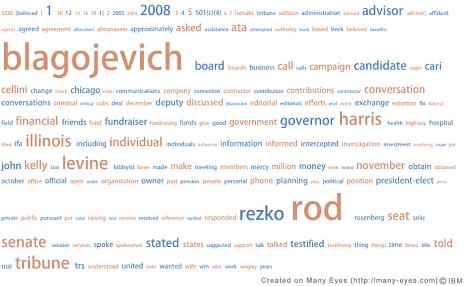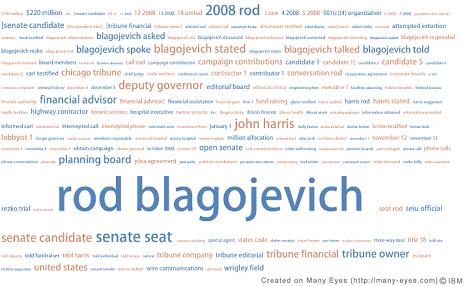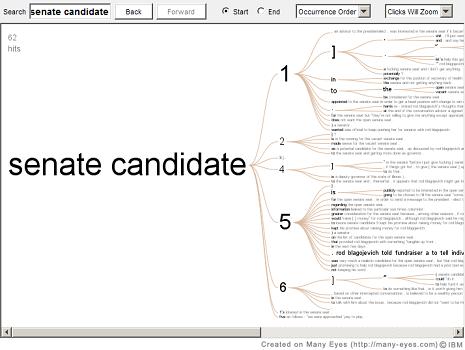I am glad to see someone of Paul Krugman’s stature picking up the same kind of analogy I’ve made a couple of times in throwaway comments at The Edge of the American West. I’m sure this means I will win a Nobel some day, although I guess I’d settle for a newspaper column (if it came with a blog).
Category: the senate
the visual display of qualitative information
If you really want to know what it’s in the criminal complaint filed against Rod Blagojevich, you can read it. But in this 2.0 world, why read when you can visualize? Bill Allison at the Sunlight Foundation’s Real Time Investigations blog uploaded the complaint (via) to a site called Many Eyes, which is the kind of site I wish I’d already known about, and which offers a number of ways to visualize text.
(Unfortunately, wordpress strips out the code that makes it possible to embed these images at their full size and functionality, so I’ve re-sized these images to be larger than what the embed codes were giving me. If you click through, you’ll be able to do all sorts of things, like re-arrange the displays, search for particular words and phrases, count or highlight specific occurrences, and even zoom in on the word tree.)
Let’s start with a Wordle:
That gives you an idea of the most important topics/people in the complaint, but it’s more of a bird’s eye perspective. If you want more precision, albeit at the cost of some visual elegance, you could look at a couple of tag clouds:
Here’s a cloud formed on the basis of single words:
And here’s a two-word tag cloud:
The two-word format does a better job capturing many of the subjects – not just the proper names, but also senate candidate, financial advisor, planning board, campaign contributions, and so on – as well as the alleged activities – Blagojevich spoke, Blagojevich talked, attempted extortion, phone calls. But it also has some pairings that are simply the result of the stylistic conventions of a criminal complaint. For example, the phrase “2008 rod,” which has 53 occurrences, isn’t a phrase in the usual sense – it’s the result of writing out the date of an alleged action (in 2008), followed by Blagojevich’s first name: “…the morning of November 12, 2008, Rod Blagojevich talked to Fundraiser A…”
Finally, the most innovative and analytically interesting visualization is the word tree. Want to know how the Senate candidates appear in the text?:
Judging by the number of occurrences, Senate candidate 3, who appears to have been identified, is looking pretty good.
Incidentally: a cursory search for profanity doesn’t turn up nearly as much as you’d expect from the news coverage.
analogy watch
How long until the Truman:Pendergast::Obama:Blagojevich analogy shows up in the major media? Never mind if the person making the analogy does a good job with differences and historical specifics. I’d just be amazed if it’s not made at all.
indirect sunlight
The Senate has never been a model of efficiency – and in some ways was specifically designed not to be – but this continues to be absurd:
Under current rules, Senate offices must print out their campaign finance reports, which lawmakers store electronically, and mail them to the Sec. of the Senate on Capitol Hill (the reports must be postmarked, though not received, by the specific deadline). The Sec. of the Senate then scans them and emails the digitalized versions to the Federal Election Commission. The FEC posts the non-searchable images online, but also prints another set of hard copies, which are driven to the offices of a government contractor in Virginia; the contractor then keys the information back into the computer in its final, searchable form.
The process takes between four to six weeks, experts say, and costs taxpayers roughly $250,000 per year.
…
It doesn’t have to be this way. The House moved to mandatory electronic filing at the start of 2001. The Senate was exempt at the time (and remains so) because that law applied only to those filing directly with the FEC. (The Senate, recall, files first to the Sec. of the Senate.) Searchable House records are available online almost immediately after members file.
[Note: Some sections of the linked article seem to imply that the forms are unavailable to the public until they are put into a searchable form. I don’t think that’s true. The page images are posted on the FEC website relatively soon after the forms are filed. The scans are often of poor quality and sometimes it’s hard to make out certain numbers or letters, but they’re still viewable. It’s a real pain to deal with, though, and certainly a deterrent to those who want to do an intensive analysis of the data. Some filings are hundreds of pages in length.]
So why hasn’t the Senate followed the House’s example?
Supporters of the move to electronic filing have long wondered why any lawmaker would oppose the shift. After all, the bill doesn’t demand fuller disclosure, simply speeds up the process. Meredith McGehee, policy director at the Campaign Legal Center, a nonprofit campaign-finance reform advocate, said that, in tight election years, that could be reason enough. “A lot of times in politics, timing is everything,” McGehee said. “This is about control of information.”
That sounds right to me. The impression I’ve gotten from following this election* fairly closely is that the way political reporting works, particularly election reporting, a lot of stories come out very quickly after the campaign finance reports are filed (the big reports are filed quarterly). Many of these are aggregate numbers stories – “took in X, has Y cash on hand” – but there are other stories about candidates’ ties to particular donors or candidates’ expenditures on things like ads or legal representation (like when a candidate is, say, under investigation or even indictment, not that recent members of Congress have had this problem). But after enough time has passed, the filings start to go stale: they lose the immediacy of “news” in the sense of “breaking news.” The information they provide might still be incorporated into a later article but the reporter will not be able to write: “FEC reports filed today/yesterday reveal…” Moreover, the delay in processing becomes increasingly important as election day nears:
In 2006, for example, voters in six of the 10 tightest Senate races had no access to third-quarter contributions — those donated in July, August and September — a week before the election. In 2004, 85 percent of third-quarter contributions were unavailable to voters in all Senate races, CFI [Campaign Finance Institute] found.
And anyway, how often is someone helped electorally by the information in their own campaign filings? I can think of Obama’s small-donor success, but not much else. So for candidates with potentially damaging information in their reports there’s an incentive to keep things the way they are. And because it’s not always clear beforehand what information could cause trouble, that’s a potentially large group.
Meanwhile, just as proponents of electronic filing can claim that the change would not entail any new disclosures, opponents can claim that they’re not against disclosure (they’re just against applying the latest technology to existing requirements). Plus, because these kinds of campaign process issues don’t get much attention – I bet most of you have stopped reading this post – and probably don’t sway that many votes, the cost of opposing the change may not be all that high.
That said, some of the opponents’ tactics have been more complicated than simply saying “no”:
Though a Senate bill would modernize the chamber’s disclosure process, GOP opposition has stalled it for more than a year. Most recently, the delay was caused by Sen. John Ensign (R-Nev.), who objected to the bill when he wasn’t permitted to attach a controversial amendment. Ensign’s addition would have required groups that file complaints with the Senate Ethics Committee to disclose their donors — something charities and other non-profits are often loathe to do.
“It’s basically a poison pill amendment,” said Craig Holman, a campaign finance lobbyist at Public Citizen.
There may be legitimate arguments in favor of requiring certain types of non-profits** to disclose their donors, but the restriction of disclosure requirements to only those groups that file complaints makes this attempt to pit transparency against transparency look transparently disingenuous.
————————————————————————-
*This is the first cycle I’ve followed this closely. In 2006 and 2004 I relied mostly on the mainstream news and a small number of political blogs.
**Here’s a story on 501(c)(4)s, if you’re into that sort of thing. It’s mostly an overview and not an explicit argument in favor of disclosure requirements, but it does give you a sense of why it would not be crazy to think that those kinds of groups should make their donor lists public.



